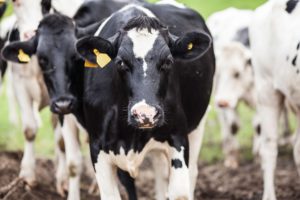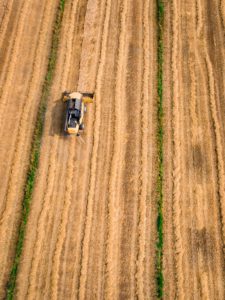Brexit and some possible unforeseen consequences for third country exports of farm products

As the UK and EU27 prepare to define the terms of their future trade relationship, Alan Swinbank, associate of TKE partner ICTSD, raises some critical questions regarding post-Brexit agricultural trade.
With the United Kingdom set to leave the European Union – “Brexit” – and Donald Trump’s withdrawal of the United States from the Trans-Pacific Partnership (TPP) and threat to do the same with the North American Free Trade Agreement (NAFTA) if its partners “refuse a renegotiation that gives American workers a fair deal,” trade arrangements around the world are in a state of flux.
Given the EU’s obscenely high tariffs on a number of agricultural commodities (and associated food and drink products) Brexit could cause severe trade disruption, and embroil scores of countries in lengthy trade negotiations (and possibly disputes) as they try to work out what Brexit means for their trade with both the UK and the remaining EU member states (EU27). Currently, agri-food products – including those imported from outside – can move freely within the EU without concerns about rules of origin. Agri-food imports from the rest of the world are regulated by the EU’s common external tariff, and its preferential trade arrangements with many countries. What will replace these trade arrangements for the UK after Brexit remains unknown, and is perhaps for the moment unknowable.
 The UK is a founder member of the World Trade Organization (WTO); and most analysts believe that, once it implements Brexit, the UK will continue to be subject to the EU’s most-favoured-nation (MFN) tariff bindings. This is by no means certain, however, or even straightforward. How will the many specific tariffs expressed in euros (e.g. €419 per tonne on sugar) be converted into pounds sterling (£) for instance? But some rather more difficult questions arise.
The UK is a founder member of the World Trade Organization (WTO); and most analysts believe that, once it implements Brexit, the UK will continue to be subject to the EU’s most-favoured-nation (MFN) tariff bindings. This is by no means certain, however, or even straightforward. How will the many specific tariffs expressed in euros (e.g. €419 per tonne on sugar) be converted into pounds sterling (£) for instance? But some rather more difficult questions arise.
First, what new UK-EU27 trade relationship (if any) will replace the UK’s present membership of the EU’s customs union; and what implications does this have for other WTO members’ access to these markets?
Second, what will happen to the many tariff rate quotas (TRQs) the EU is currently obliged to offer WTO members: will these be shared-out in some (as yet unknown) way between the UK and EU27?
Third, assuming the UK breaks free of the EU customs union, what trade policy will the UK then adopt?
Will it opt for free trade, with a unilateral reduction of tariffs, as advocated by some economists, or instead apply its MFN tariff bindings? With regard to developing countries, will it retain the EU’s Generalized System of Preferences (GSP) and Everything But Arms (EBA) schemes? How will it deal with the many free trade area (FTA) agreements the EU has negotiated around the world, including for example the Economic Partnership Agreements (EPAs) with former partners from the African, Caribbean, and Pacific Group of States (ACP)? And with regard to sanitary and phytosanitary certification and conformity assessment, will the UK continue to accept third country products that meet EU standards, and – reciprocally – will UK products still be accepted on their markets? Or will new agreements need to be negotiated?
UK-EU27 Trade Arrangements
If the UK and EU27 do succeed in negotiating the “ambitious and comprehensive” FTA the UK has said it plans to secure, how might that affect third country access? Unless the UK and EU27 negotiate a FTA agreement that is almost a customs union – with similar tariffs on imports and very liberal rules of origin – third country products could be treated less favourably than they are now. Take raw cane sugar imported into the UK for refining. The refined cane sugar would almost certainly not be in free circulation in the UK-EU27 FTA. In addition, UK-based food and drink manufacturers might be loath to incorporate cane sugar – rather than sugar derived from sugar beet grown on British farms – into their processed products for fear of infringing rules of origin on export to EU27.
The polar extreme is that, on Brexit, there will be no FTA in place and that the UK and EU27 will perforce trade with each other across their full MFN tariffs. This would be particularly problematic over the politically sensitive land border between the UK and EU27 on the island of Ireland; and it could cause severe disruption to the very substantial agri-food trade flows between the UK and EU27. This might be advantageous for some third country suppliers (displacing British products from EU27 markets for example), but could have unfortunate consequences. Imports into highly protected markets (butter, beef, sugar for example) are only possible when preferential access is granted, and the EU’s TRQs are one example.
 The UK both imports beef from, and exports it to, the EU. Following Brexit, will Irish products be competing with South American, and US, beef for TRQ import licences into the UK? Access to TRQs can be contentious. In part settlement of the Beef Hormone dispute with the US, the EU introduced a TRQ for 45,000 tonnes of beef produced without growth-promoting hormones. As time has gone by an increasing proportion of this TRQ has been filled by non-US suppliers and so, it is claimed, the TRQ “has not in practice provided benefits to the U.S. beef industry sufficient to compensate for the economic harm resulting from the EU ban on all but specially-produced U.S. beef.” Consequently the United States Trade Representative is considering whether trade sanctions against the EU should be re-imposed. Might Brexit lead to similar concerns, and actions?
The UK both imports beef from, and exports it to, the EU. Following Brexit, will Irish products be competing with South American, and US, beef for TRQ import licences into the UK? Access to TRQs can be contentious. In part settlement of the Beef Hormone dispute with the US, the EU introduced a TRQ for 45,000 tonnes of beef produced without growth-promoting hormones. As time has gone by an increasing proportion of this TRQ has been filled by non-US suppliers and so, it is claimed, the TRQ “has not in practice provided benefits to the U.S. beef industry sufficient to compensate for the economic harm resulting from the EU ban on all but specially-produced U.S. beef.” Consequently the United States Trade Representative is considering whether trade sanctions against the EU should be re-imposed. Might Brexit lead to similar concerns, and actions?
Domestic Support
It is not only a new agri-food trade regime that must be agreed for the UK. In addition, the government will need to determine the level of taxpayer funding (if any) it is willing to devote to subsidising British agriculture, and encouraging the provision of environmental services including possible new schemes such as carbon sequestration. WTO Members will doubtless follow these developments closely, checking they comply with the UK’s obligations, particularly those set out in the Agreement on Agriculture. However it seems to me unlikely that the post-Brexit UK will spend more on farm subsidies than would have been the case under the common agricultural policy (CAP), or that – unlike EU27 – it will revert to trade-distorting support.
For further reading on some of the questions raised in this post please see World Trade Rules and the Policy Options for British Agriculture post-Brexit by Alan Swinbank.
Alan Swinbank is an Emeritus Professor of Agricultural Economics at the University of Reading in the UK.
This article is originally from the website of TKE partner, ICTSD. The original page can be found here.